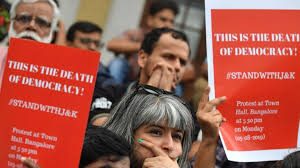Newspaper Article 26/08/2019
In June last year, the BJP government pulled out of a coalition with the Jammu and Kashmir Peoples Democratic Party. Afterwards, India-occupied Jammu and Kashmir was put under governor’s rule. New Delhi’s latest move to abrogate Article 370 of the Indian constitution has ended the special status of occupied Jammu and Kashmir. The parliamentary bill to change the administrative status of the occupied region from a state to a Union Territory will bifurcate Ladakh and J&K. This will further weaken the occupied territory. How can India justify the UN Security Council resolutions on Kashmir which give the people the plebiscite right? The use of force in J&K will not lead to any peaceful settlement; rather it could trigger regional tension. In response if India employs force, the net result will be damaging for the entire region. Thereby, what plausible options exist? Will India reverse the decision peacefully or will it continue to damage Kashmir and the region?
In the emerging regional power dynamics, coercive approaches have taken a backseat, and economic prowess is the driving force. The up and coming economic corridors in the region and adjoining areas (of which Pakistan is a part) are defining trends. The states forming part of the regional connectivity through the corridor or trade will be economically linked which, in turn, will impact their foreign policy orientation, as these countries will build their ties with foreign players according to their economic interests. In that situation, India may lose ground to major players in the region. Given this backdrop, the current Indian move could be a frustrated attempt to seek attention, and downplay the country’s stepping up towards regionalism. Moreover, the India-Pakistan relations have been central to the region’s peace. With the emerging corridors Pakistan’s position is likely to strengthen, as Gwadar seaport will be a trading channel for the adjoining countries and the greater region. The regional environment favours a stable and economically strong Pakistan, but this may not bode well with certain quarters. India has vociferously objected to the China-Pakistan Economic Corridor (CPEC) and has tried to sabotage the developmental work in Balochistan.
The energy projects and economic corridors require regional peace in order to be completed and become operational. This will bring in prosperity for the entire region, and the players will be able to counter transnational challenges effectively. However, this requires a regional approach and a vision to look beyond the legacy of the Partition. Neighbouring states need to unite to save the region from extremists and frustrate hijacking tactics. This is a challenging task for the entire region but through political and diplomatic maneuvering, Indian acts can be countered. The role of regional and international bodies in dissuading India from promulgating further tension is important. UN Secretary-General Antonio Guterres said, “Held Kashmir is a disputed territory recognised by the UN.” The international body needs to play a lead role in stopping New Delhi from more extreme acts. The Shanghai Cooperation Organisation (SCO), though not directly a party, can play a positive role in de-escalating the tension between member states — Pakistan and India.
Pakistan needs to fight for the Kashmir cause on political, legal and humane grounds. So far, the UN, the US, the UK, China and Turkey have expressed concern over the regional tension. It needs to be projected that Indian extremist acts are not confined to minorities living in the country, rather the Hindutva mindset is the cornerstone of India’s foreign policy. Such provocative attempts by India are a threat to the region’s peace and have reinforced extremist tendencies.
A version of article appeared in Express Tribune dated August 18, 2019
[The views expressed in the article are of the author and do not necessarily reflect the policy of Institute]

